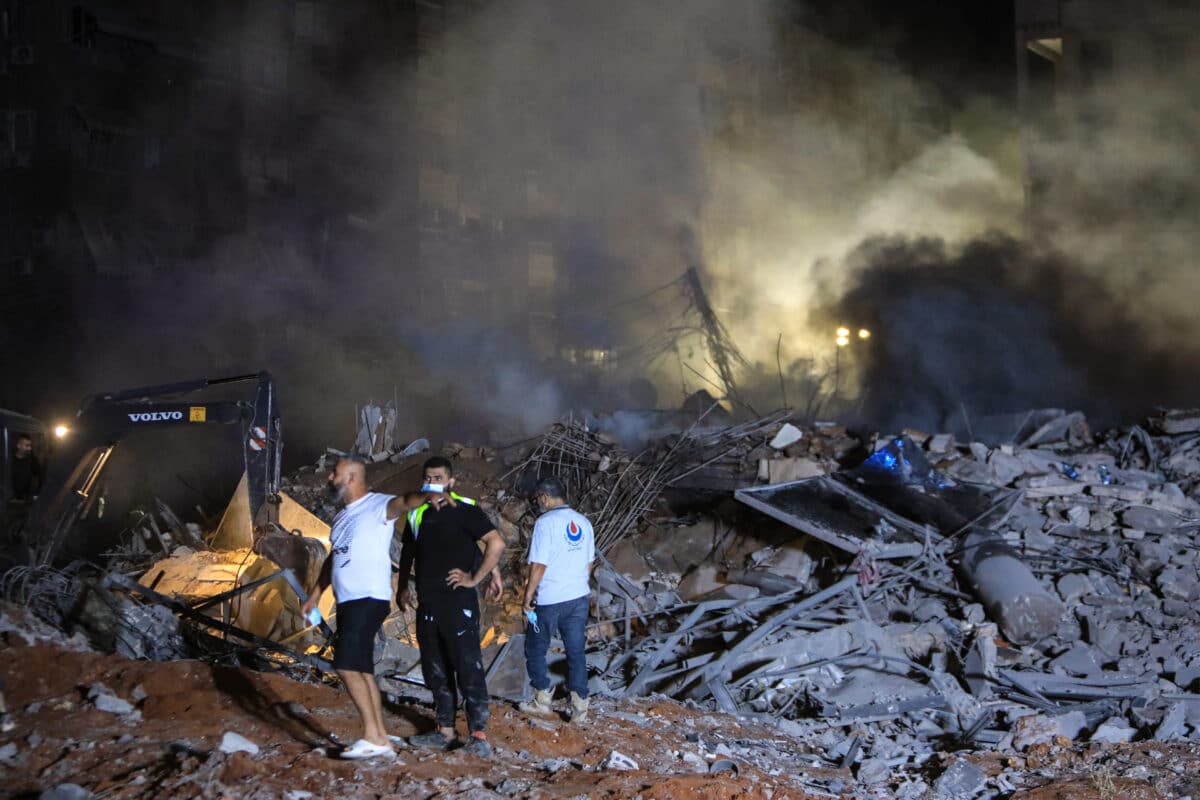
Rescuers stand on the rubble of a building destroyed in an Israeli air strike in the Haret Hreik neighborhood of Beirut’s southern suburbs on September 27, 2024. Israel carried out air strikes on the south of Lebanon’s capital Beirut on September 27 that it said targeted Hezbollah’s headquarters, moments after Prime Minister Benjamin Netanyahu vowed to keep fighting the militant group. (Photo by AFP)
BEIRUT, Lebanon — Israel conducted a wave of air strikes on the south of Lebanon’s capital Beirut on Friday that it said targeted Hezbollah’s headquarters, moments after Prime Minister Benjamin Netanyahu vowed to keep fighting the militant group.
The strikes, heard across the Mediterranean city, sent huge clouds of smoke soaring above its densely populated southern suburbs, the main bastion of Iran-backed Hezbollah.
Hezbollah has been fighting Israeli troops along the Lebanon border since its Palestinian ally Hamas staged its unprecedented attack on Israel on October 7.
Israel shifted its focus from the war in Gaza to Lebanon this week, unleashing air strikes on Hezbollah strongholds around the country that have killed hundreds and forced 118,000 more to flee their homes.
While Friday’s strikes on south Beirut were not this week’s first, they were by far the fiercest.
“Oh my God, what strikes. I felt like the building was going to collapse on top of me,” said Abir Hammoud, a teacher in her 40s who lives in the southern suburbs of Beirut.
Vowing to secure its border with Lebanon, Israel has since Monday pounded Hezbollah strongholds chiefly in the east and south of the country, defying calls from world leaders and aid agencies to halt the violence.
Nasrallah ‘fine’
A source close to Hezbollah said the strikes leveled six buildings, and according to a preliminary toll, two people were killed and 76 wounded.
Israeli military spokesman Daniel Hagari said the strike targeted “the central headquarters” of Hezbollah in the southern suburbs of the city.
Israeli television networks reported that Hezbollah chief Hassan Nasrallah was the target of the strike, though a source close to Hezbollah said he was “fine”.
The bombing came moments after Netanyahu concluded his address to UN General Assembly delegates in New York, in which he vowed to keep up strikes against Hezbollah and fight “until victory” against Hamas.
Earlier this month, Netanyahu said Israel would fight Hezbollah until thousands of Israelis displaced by the cross-border fighting could return to their homes.
“As long as Hezbollah chooses the path of war, Israel has no choice, and Israel has every right to remove this threat and return our citizens to their home safe,” Netanyahu told the UN General Assembly, adding that operations against the Iran-backed militant group will “continue until we meet our objectives.”
Earlier Friday, Hezbollah fired rockets into the northern Israeli city of Tiberias, saying it was responding to “savage” strikes on Lebanese towns and villages.
‘Deadliest in a generation’
The UN has repeatedly condemned the sharp escalation of violence between Israel and Lebanon.
“We are witnessing the deadliest period in Lebanon in a generation, and many express their fear that this is just the beginning,” the UN humanitarian coordinator in Lebanon, Imran Riza, said.
In Israel, too, many were weary of the violence.
“It is incredibly exhausting to be in this situation. We don’t really know what’s going to happen, there’s talk of a ground offensive or a major operation,” said Lital Shmuelovich, a physiotherapy student.
In New York, Netanyahu also addressed the war in Gaza, saying that Israel’s military would continue to fight Hamas until the Islamist movement was crushed.
“If Hamas stays in power, it will regroup… and attack Israel again and again and again… So Hamas has got to go,” Netanyahu said, vowing to fight the group until “total victory.”
Diplomats have said efforts to end the war in Gaza were key to halting the fighting in Lebanon and bringing the region back from the brink of all-out war.
But despite months of mediation efforts, a Gaza ceasefire remains elusive.
Hamas’s October 7 attack resulted in the deaths of 1,205 people, mostly civilians, according to an AFP tally based on Israeli official figures that include hostages killed in captivity.
Of the 251 hostages seized by militants, 97 are still held in Gaza, including 33 the Israeli military says are dead.
Israel’s retaliatory military offensive has killed at least 41,534 people in Gaza, most of them civilians, according to figures provided by the Hamas-run territory’s health ministry. The UN has described the figures as reliable.
‘Change the rules’
The Lebanon violence has raised fears of wider turmoil in the Middle East, with Iran-backed militants across the region vowing to keep up their fight with Israel.
Netanyahu took aim at Iran in his UN General Assembly address, saying: “I have a message for the tyrants of Tehran. If you strike us, we will strike you.”
He added: “There is no place in Iran that the long arm of Israel cannot reach, and that’s true of the entire Middle East.”
Analysts have said Iran would try to resist being dragged into the conflict.
But following the Beirut strikes, Iran’s embassy in Lebanon said: “This reprehensible crime… represents a dangerous escalation that changes the rules of the game.”
Israel “will receive the appropriate punishment,” it added in a post on X.

